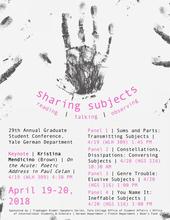Graduate Student Conference 2018. Sharing Subjects: Reading – Talking – Observing
Graduate Student Conference 2018
Department of Germanic Languages and Literatures, Yale University
Keynote Speaker: Kristina Mendicino, Brown University
“Allein zu essen ist für einen philosophierenden Gelehrten ungesund
[…] erschöpfende Arbeit, nicht belebendes Spiel der Gedanken.”
— Immanuel Kant, Anthropologie in pragmatischer Hinsicht
Alone is the only standpoint from which one can say “x is beautiful,” as Kant argues in his conception of aesthetic judgment in the Critique of Judgment (1790). However, the utterance “x is beautiful” also precludes one from being alone insofar as it implicates everyone (jedermann), although not vicariously. This paradox between the singularity and shareability of aesthetic judgment has manifested itself in other texts in which the issue of subject-object mediation has been at stake.
Goethe takes up a version of this paradox in his essay “Der Versuch als Vermittler von Objekt und Subjekt” (1792) by exposing science as neither a subjective experience nor an objectifying enterprise. Rather than a formulation of hypotheses that purport to describe suprasensible relations, it is gathering, ordering, and, ultimately, sharing of individual experiences (einzelne Erfahrungen) – i.e., the act of observing as an ongoing and ever-transforming conversation within an intersubjective community – that, for Goethe, constitutes scientific investigation. From a different angle, Kleist unfolds the constitutive un-aloneness of the thinking subject in his performatively structured essay “Über die allmähliche Verfertigung der Gedanken beim Reden” (ca. 1805) by revealing this subject’s inextricable enspiritment (Begeisterung) in the presence of another. Here, interaction with, and interruption by, another is the necessary condition of thoughts as fabricated in the process of talking. Finally, through its incessant use of detours and similes, Benjamin’s essay “Die Lehre vom Ähnlichen” (1933) demands a radical singularity of reading captured in the essay’s figure of the reader as der Dritte, the third element constituting the constellation of reading. This shift in perspective, in turn, calls into question the possibility of relating to the textual object intersubjectively by way of commonly available paraphrase.
While all these texts speak to specific problems in modern arts and sciences, they also lend themselves to being read from a different perspective. Namely, like Kant’s conception of the beautiful, these three texts by Goethe, Kleist, and Benjamin dramatize and problematize the possibility of intersubjective relation on the basis of a seemingly common object.
The graduate student conference Sharing Subjects: Reading – Talking – Observing will explore the ways in which texts think through modes of accessing and sharing, and seek to do so through animated discussion to which all participants and attendees feel able to contribute meaningfully. In order to facilitate such an environment, we ask that speakers include a clear presentation of their cited material in addition to a pre-written paper. With this format in mind, we welcome contributions that share a careful reading of brief passages from a literary, philosophical, visual, or multimedia text to reflect upon some of the following topics:
- The relationship of the reader to the text: how texts implicate their reader
- Shareability: the text as the basis of community or intersubjective relation
- The historical topoi of Gespräch and Geselligkeit in Jena Romanticism
- Reflexivity and performativity in the act of talking, reading, or observing
- Failed conversations: interruption, distraction, incomprehension, chatter
- Non-conceptual ordering: albums, constellations, series
- Observation and blind spots: how perspectives include and exclude
- The epistemic status of texts: in what ways literary texts do not operate according to propositional language
- Temporalities of texts / Temporalities of talking, reading, and observing
This event is generously sponsored by the Yale German Department, the Yale French Department, the Dean’s Fund, the Office of International Students and Scholars, and the Traphagen Alumni Speakers Series, Yale College Office of Student Affairs.
Schedule
Thursday sessions will take place in WLH, Room 309, and Friday sessions will meet in HGS 116.
Thursday, April 19, 2018 (WLH 309)
1:30 – 1:45 Welcoming remarks
1:45 – 4:00 Panel 1 | Sums and Parts: Transmitting Subjects
Shan Zhang (Northwestern/Fudan University)
Dialogue and Friedrich Schlegel’s Romantic Poetry
Beatrice Occhini (Università L’Orientale)
“Erfahrung des partiellen Nichtverstehens”: Uljana Wolf’s Incomprehensibility as a Form of Literary Resistance
Rosa Coppola (Università L’Orientale)
Let the Receiver Direct: Efficacy in Kathrin Röggla’s Prose
Insa Braun (HU Berlin)
“Ich ohne Gewähr”: The Absent Subject in Ingeborg Bachmann’s Frankfurt Lectures on Poetics
4:00 – 4:30 Coffee Break
4:30 – 6:00 Keynote Address
Professor Kristina Mendicino (Brown)
On the Acute: Poetic Address in Paul Celan
6:00 – 7:00 Reception
7:00 Dinner for conference participants
Friday, April 20, 2018 (HGS 116)
10:00 – 10:30 Breakfast
10:30 – 12:00 Panel 2 | Constellations, Dissipations: Conversing Subjects
Daniel Lange (Brown)
Addressing Tables: Francis Ponge
Elisa Santucci-Nitis (Johns Hopkins)
B anal iii
Sorrel Dunn (Northwestern)
Textuality as (Inter)subjectivity: Melancholy Language in Benjamin and Kristeva
12:00 – 1:00 Lunch
1:00 – 2:30 Panel 3 | Genre Trouble: Elusive Subjects
Katharina Kreuzpaintner (HU Berlin)
There Is No Sexual Rapport?/Il n’y a pas de rapport sexuel? Friedrich Kittler’s “Writing into the Wind, Bettina”
Maya Nitis (Johns Hopkins)
Narretei des Narrativs: The Intersection of Hi-stories, Realities and Poetology
Marie-Luise Goldmann (NYU)
“Es geht nur so die Rede”: Rumors and Unreliable Report in Theodor Storm’s Der Schimmelreiter
2:30 – 3:00 Coffee Break
3:00 – 4:30 Panel 4 | You Name It: Ineffable Subjects
Ariel Leutheusser (CUNY Graduate Center)
Unspeakable Affect in Friedrich Schiller’s Dramas
John Kreitzberg (University of Chicago)
Drinking an Ocean That Doesn’t Exist: The Ethics of Decreation in Beckett’s The Unnamable
Thomas Sliwowski (UC Berkeley)
Odradek’s Archive
4:30 – 4:45 Concluding remarks
